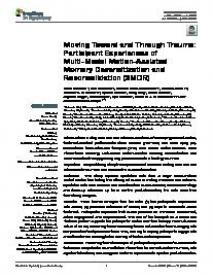Moving Toward and Through Trauma : Participant Experiences of Multi-Modal Motion-Assisted Memory Desensitization and Reconsolidation (3MDR)
Introduction: Military members and Veterans are at risk of developing combat-related, treatment-resistant posttraumatic stress disorder (TR-PTSD) and moral injury (MI). Conventional trauma-focused therapies (TFTs) have shown limited success. Novel interventions including Multi-modal Motion-assisted Memory Desensitization and Reconsolidation therapy (3MDR) may prove successful in treating TR-PTSD.
Objective: To qualitatively study the experiences of Canadian military members and Veterans with TR-PTSD who received the 3MDR intervention.
Methods: This study explored qualitative data from a larger mixed-method waitlist control trial testing the efficacy of 3MDR in military members and veterans. Qualitative data were recorded and collected from 3MDR sessions, session debriefings and follow-up interviews up to 6 months post-intervention; the data were then thematically analyzed.
Results: Three themes emerged from the data: (1) the participants' experiences with 3MDR; (2) perceived outcomes of 3MDR; and (3) keys to successful 3MDR treatment. Participants expressed that 3MDR provided an immersive environment, active engagement and empowerment. The role of the therapist as a coach and “fireteam partner” supports the participants' control over their therapy. The multi-modal nature of 3MDR, combining treadmill-walking toward self-selected trauma imagery with components of multiple conventional TFTs, was key to helping participants engage with and attribute new meaning to the memory of the traumatic experience.
Discussion: Preliminary thematic analysis of participant experiences of 3MDR indicate that 3MDR has potential as an effective intervention for combat-related TR-PTSD, with significant functional, well-being and relational improvements reported post-intervention.
Conclusion: Military members and Veterans are at risk of developing TR-PTSD, with worse outcomes than in civilians. Further research is needed into 3MDR and its use with other trauma-affected populations.
In: Frontiers in Psychiatry ; ISSN: 1664-0640
https://doi.org/10.3389/fpsyt.2021.779829
Epub DOI: 10.3389/fpsyt.2021.779829


